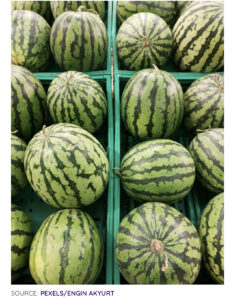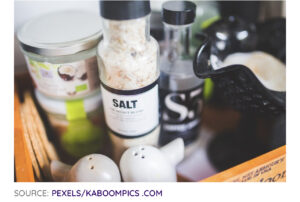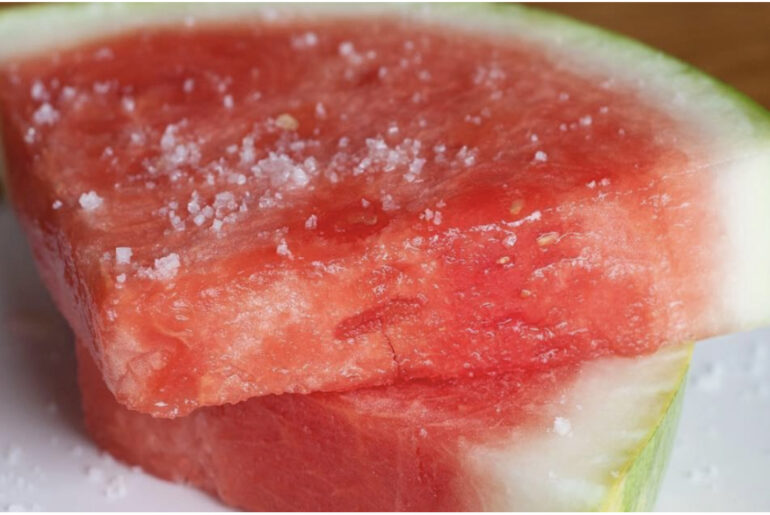There’s a reason its been a favorite in the South for over a century. ????????????
You are on home quarantine, you are bored and hungry, so you decide to head out to the kitchen. As you open the fridge, there is a large and fresh watermelon waiving at you. You slice it into chunks and gobble it in an instant.
Oh, you forgot something! Something that will make that watermelon even sweeter- salt!
Yes, you read it right, salt! You might be wondering, how will salt make the watermelon sweeter? Then let’s all find that out.
Have you ever been to the South?
If you have ever spent summer somewhere in the South, then you must’ve experienced being offered a sprinkle of salt on your watermelon, am I right? While some, especially those who are not used to it, really prefer to eat their melons plain.
There is just really something about the watermelon + salt combination that will make your taste buds agree that it’s a lot better than eating it plain.
I personally grew up in South East Asia, and I can relate to this. We even put some tabasco pepper on it and sometimes, sugar cane vinegar with tabasco pepper.
Sounds weird, right? But only until you taste it.
Essentially if you add something savory to something sweet, it opens up your tastebuds and makes it sweeter. The sweetness of the watermelon will even come crashing over your taste buds if it’s mixed with a pinch of salt.
More about watermelon and salt.

According to Wikipedia, watermelon is,
“…a flowering plant that originated in West Africa, where it can also be found growing in the wild. Citrullus colocynthis may be a wild ancestor of the watermelon; its native range extends from north and west Africa to west India, and was observed growing wild in central Africa.”

While some may think that salt is a laboratory-made or factory-made type of condiment and that it’s only being used in the kitchen, Wikipedia says that salt,
“…is processed from salt mines, and by the evaporation of seawater (sea salt) and mineral-rich spring water in shallow pools. Its major industrial products are caustic soda and chlorine; salt is used in many industrial processes including the manufacture of polyvinyl chloride, plastics, paper pulp and many other products. Of the annual global production of around two hundred million tonnes of salt, about 6% is used for human consumption. Other uses include water conditioning processes, de-icing highways, and agricultural use.”
What are the health benefits of eating a watermelon?
As listed by Health Line, below are the Top 9 health benefits of eating watermelon.
1. Helps You Hydrate
2. Contains Nutrients and Beneficial Plant Compounds
One cup (154 grams) of watermelon has many other nutrients as well, including these vitamins and minerals:
Vitamin C: 21% of the Reference Daily Intake (RDI)
Vitamin A: 18% of the RDI
Potassium: 5% of the RDI
Magnesium: 4% of the RDI
Vitamins B1, B5 and B6: 3% of the RDI
While Vitamin C, Carotenoids, Lycopene, and Cucurbitacin E are watermelon’s important antioxidants.
3. Contains Compounds That May Help Prevent Cancer
ADVERTISEMENT
4. May Improve Heart Health
5. May Lower Inflammation and Oxidative Stress
6. May Help Prevent Macular Degeneration
7. May Help Relieve Muscle Soreness
8. Is Good for Skin and Hair
9. Can Improve Digestion
How to prepare this simple watermelon + salt combo?
Actually, Post and Courier shares that a story from 1910 responds to a local asking how best to prepare watermelon:
“Cut the ripe, pink flesh from a good-sized watermelon, put it into a freezing can and pack with salt and ice; turn the crank slowly until the watermelon is half-frozen. Serve in punch bowl glasses at the end of dinner. Those who use wine, may add to each glass a tablespoonful of sherry.”
Southerners are reinventing when it comes to food and there’s no harm in it. Why don’t you try it and be the judge if salt on watermelon makes it worth touching our taste buds or not.
Please SHARE this with your friends and family.




